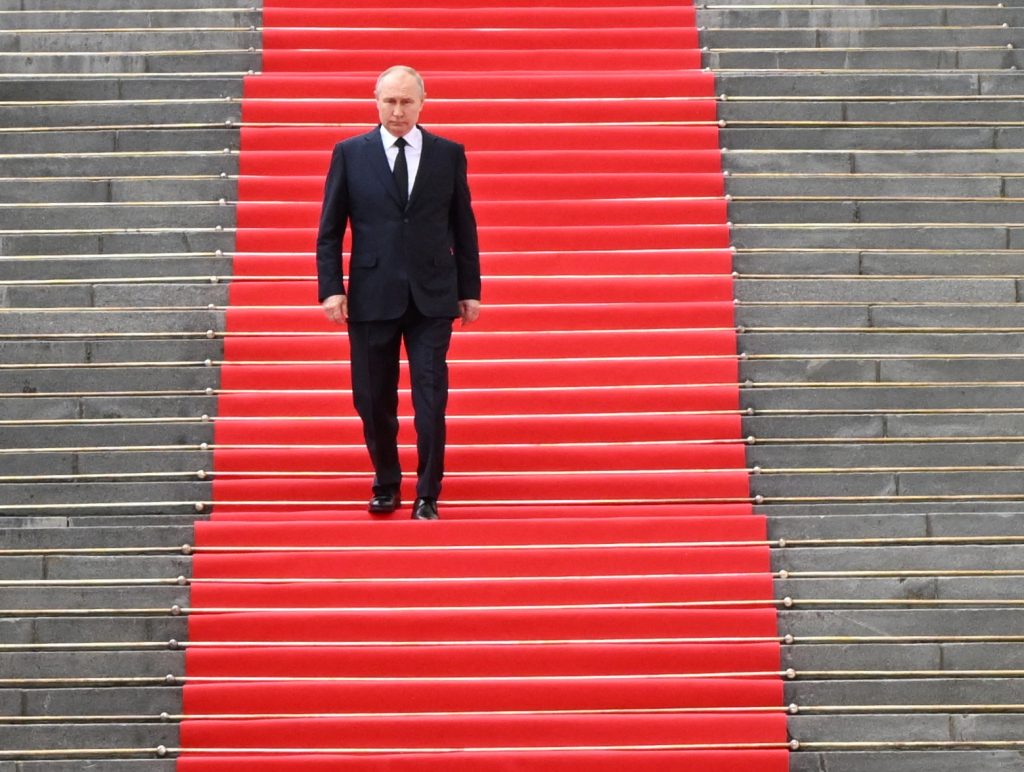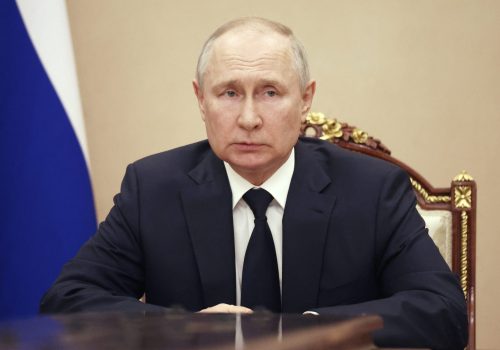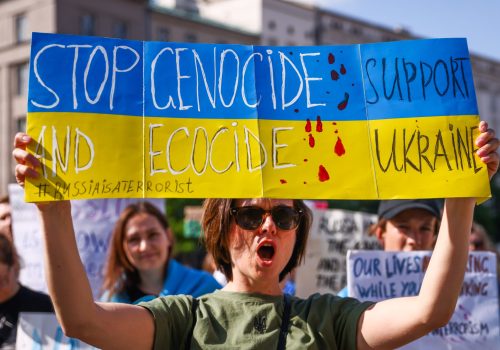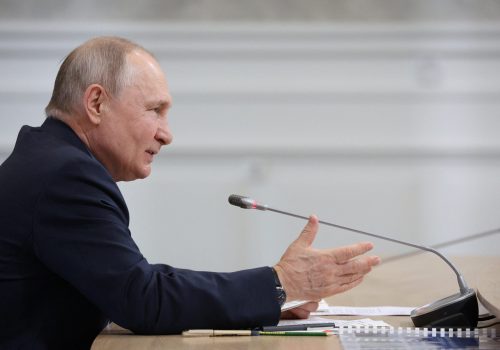The recent revolt by Russia’s Wagner Group was a short-lived affair but the repercussions continue to be felt throughout the Russian Federation and beyond. Perhaps the biggest single lesson from the aborted coup is the fragility of the Putin regime. For many years, the Kremlin has sought to present Vladimir Putin as a powerful and popular ruler exercising complete control over a loyal and disciplined power vertical. The Wagner uprising has now shattered this myth of Putin the strongman.
Ever since coming to power at the turn of the millennium, Putin has sought to portray himself as an uncompromising and macho leader. He has frequently employed vulgar slang when promising to dispatch his opponents, and has notoriously engaged in a series of PR stunts including posing topless on horseback and scuba-diving to “discover” ancient Greek urns. However, there was little sign of this tough guy persona during the early stages of the Wagner revolt in late June. As Wagner troops captured Rostov-on-Don and began to march on Moscow, the Russian dictator was nowhere to be seen. He did not appear until the second day of the mutiny, when he delivered a brief video address.
The Kremlin appears to recognize the seriousness of the situation, and has since embarked on an intensive post-putsch PR offensive designed to repair public perceptions of Putin. In the days following the Wagner drama, the Russian dictator has made a flurry of carefully choreographed appearances emphasizing national unity and regime stability. However, this sudden burst of activity has only served to highlight the damage done by Putin’s earlier absence. In a little over twenty-four hours, the Putin regime was exposed as significantly weaker than almost anybody had previously imagined. Despite the best efforts of the Kremlin propaganda machine, this fact is plain as day to both the international community and the Russian elite.
Stay updated
As the world watches the Russian invasion of Ukraine unfold, UkraineAlert delivers the best Atlantic Council expert insight and analysis on Ukraine twice a week directly to your inbox.
Nobody will have failed to notice that while Putin has continued to talk tough, he failed to crush the Wagner uprising and instead struck some kind of deal with Wagner leader Yevgeniy Prigozhin and his mutinous troops. Putin demonstrated a readiness to compromise despite the fact that Wagner fighters reportedly shot down a number of Russian aircraft and killed numerous Russian airmen. This indicated an apparent lack of concern for the lives of Russian servicemen at a time when tens of thousands of Russian soldiers have already been killed as a result of Putin’s fateful decision to invade Ukraine.
The brief Wagner uprising also revealed a remarkable shortage of Russian military strength and fighting spirit on the home front. Wagner troops were able to seize one of Russia’s largest cities, Rostov-on-Don, without a fight. Perhaps even more significantly, they were cheered and supported by crowds of locals. Wagner forces then advanced to within 200 kilometers of Moscow virtually unopposed before choosing to turn back.
Meanwhile, there was no surge in street-level or elite support for Putin. Instead, pro-war propagandists fell largely silent as rumors swirled of establishment figures fleeing Moscow. For a brief period, Russia looked to be leaderless and defenseless. The immediate danger has now passed, but these stunning developments have changed attitudes toward Putin and his regime in fundamental ways.
Eurasia Center events

It would appear that history repeats itself. Just as in 1990 very few foresaw the looming collapse of the USSR, Russia now once again looks suddenly fragile. Unsurprisingly, this is regarded as good news in Ukraine, where any sign of Russian instability is welcomed. Attitudes elsewhere are not so clear-cut. Many international observers are openly alarmed by the potential demise of the Russian Federation in its current form. They worry about the fate of Russia’s vast nuclear arsenal, and also question the legitimacy of the many new states that could potentially emerge from the wreckage of Putin’s Russia.
These concerns mirror attitudes during the 1991 breakup of the Soviet Union. Indeed, it is often forgotten that US President George Bush H. W. Bush came to Kyiv in the weeks before Ukraine’s August 1991 declaration of independence to argue against such a move in his “Chicken Kiev” speech. Many of today’s leaders share these fears over the potential disintegration of Russia. Nevertheless, the Wagner revolt has demonstrated that the Putin regime may well collapse due to its own internal weaknesses, regardless of the Western world’s wishes.
Elements of the international community, including in the West, also cling to the idea of reaching some kind of compromise and returning to business as usual with Russia. While it is obvious to almost everyone in Ukraine and in nearby countries including Poland and the Baltic states that Russia will only stop when it is decisively defeated, there are still many observers elsewhere who believe they can turn back the clock to 2021 or even 2013. They fondly recall a time when Vladimir Putin was the respected leader of a economically strong nation at the heart of global affairs, and dream of returning to this state of affairs. Such thinking is dangerously delusional.
In reality, there can be no way back to international respectability for Putin. As a result of the disastrous invasion of Ukraine, he will be an enemy of the entire Western world for as long as he remains in power. Crucially for the future of his regime, Putin is also clearly no longer able to guarantee domestic security or protect the interests of the Russian elite on the international stage.
As the international community assesses the fallout from the Wagner revolt, it no longer makes sense to be afraid of a new Russian collapse. On the contrary, the time has come to begin preparing for the possibility of a post-Putin Russia. Western policymakers should now be thinking seriously about how to make any future transition as smooth as possible. This means preparing for the emergence of a democratic Russia, and also exploring what a breakup of the current Russian Federation into a number of smaller states would mean for international security.
When similar processes were underway in the early 1990s, the international community prioritized stability above all else, paving the way for the eventual rise of a revisionist Russia under Putin. This time, a new Russian collapse should be managed in order to bring about a sustainable shift toward democracy. The experience of the past three decades has demonstrated that this is the only way to secure a durable peace. Today’s Western leaders must learn from the mistakes of their predecessors in order to avoid repeating them.
Oleksiy Goncharenko is a member of the Ukrainian parliament with the European Solidarity party.
Further reading
The views expressed in UkraineAlert are solely those of the authors and do not necessarily reflect the views of the Atlantic Council, its staff, or its supporters.

The Eurasia Center’s mission is to enhance transatlantic cooperation in promoting stability, democratic values and prosperity in Eurasia, from Eastern Europe and Turkey in the West to the Caucasus, Russia and Central Asia in the East.
Follow us on social media
and support our work
Image: Russian President Vladimir Putin walks downstairs before addressing members of Russian military units, the National Guard and security services to pay honour to armed forces, that upheld order during recent mutiny, in Cathedral Square at the Kremlin in Moscow, Russia, June 27, 2023. (Sputnik/Sergei Guneev/Pool via REUTERS)




